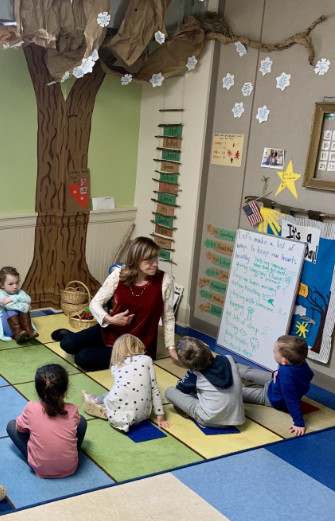Educational Philosophy & Curriculum
The Highlandtown Preschool uses the Frog Street Pre-K curriculum as the underlying basis for our program, which supports every aspect of your child’s development—physical, social, emotional, cognitive, and linguistic. Frog Street is an MSDE-approved curriculum that uses age and developmental appropriate activities to promote learning in math, language and literacy.
As we have grown and developed as a school since our opening, we have created more and more of our own content tailored to the needs of our students, the gifts of our staff, and the opportunity for nature-based education in Patterson Park and environs.
Our curriculum and talented staff will work with your child daily in the following areas:
Number and Operations
(understanding quantity and numerical relationships)
Children will learn to correspond the verbal sequence of numbers (1,2,3,4,5,6,7,8,9…) in a one-to-one relationship with sets of concrete, pictorial, and auditory collections and understand that the last counting word in the sequence tells how many there are all together. Children will engage in meaningful activities that lead them to understand patterns and apply counting as a sense-making strategy for naming, combining, separating, comparing quantities and quantifying data.
Geometry and Spatial Awareness
(understanding shape, location, and spatial transformations)
Children will learn to recognize and describe the attributes of two- and three-dimensional shapes (for example, a triangle has three straight sides and three corners) and understand how shapes are alike a different. They will also learn to describe an object’s location in relation to other objects and how a shape’s orientation changes when it moves by sliding, flipping, or turning in space. Children will participate in activities in which they use concrete materials to compare, build, and take apart shapes, as well as move objects to make various visual and spatial transformations.
Measurement
(quantifying and comparing space length, weight, area, and volume)
Children will directly compare measurable attributes, including length, weight, area, and volume using language such as longer, shorter, heavier, wider, and fuller. They will also begin to compare, measure, and order various objects using non-standard units (cubes, string) as well as formal tools, such as a balance scale
Phonological Awareness
(being able to hear and reproduce sounds)
Children will become aware of how sounds in words work. They will identify and manipulate parts of spoken language—words, syllables, beginning sounds, rhymes, onsets (the sound in a word preceding the first vowel), and rimes as well as individual phonemes. Children will participate in reciting rhymes, chants, and finger plays; clapping syllables in words and words in sentences; and singing songs intentionally selected to develop and refine their listening ability.
Alphabet Knowledge
(recognizing letters and their function)
Children will learn to recognize and name uppercase and lowercase letters and that each letter makes a unique sound. Children will participate in letter recognition activities and learn to reproduce letters as they practice identifying the differences in their shapes and lines. Vocabulary learning words Children use words to communicate effectively when speaking and when understanding what others say. Children will grow their vocabularies as they engage in conversations with peers and adults and through intentional vocabulary instruction associated with books and lessons.
Comprehension
(retelling stories in own words)
Children will learn to answer and generate questions and to identify story structure (plot, setting, characters). Children will listen to several stories each day and participate in discussing the story, answering and posing questions, story mapping, and comparing and contrasting stories and characters.
Written Expression
(understanding of the functions of writing)
Children develop an understanding of the purpose of writing and of how to use writing to convey their thoughts. Children will participate in Morning Message each day. During this time the teacher will model writing. Throughout the day children will practice their writing skills as they write notes, maintain a journal, create books, label pictures, and much more. Your child will spend this school year hard at work developing the necessary concepts and attaining skills that provide the foundation for reading and writing success.
The guiding philosophical principals of our school are:
- Positive interactions and relationships with helping adults provide a foundation for successful learning
- Social emotional competence is a significant factor in school success
- Constructive, purposeful play supports learning
- The physical environment affects the type and quality of learning interactions
- Teacher-family-Community partnerships promote healthy development and learning

